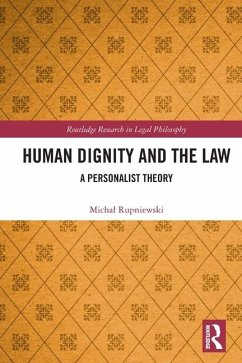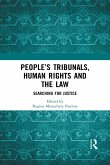- Broschiertes Buch
- Merkliste
- Auf die Merkliste
- Bewerten Bewerten
- Teilen
- Produkt teilen
- Produkterinnerung
- Produkterinnerung
This book reassesses the relationship between human dignity, law and specifically the 'personalist' school of agency. It will be of interest to academics and researchers working in the areas of Legal Philosophy, Jurisprudence, Philosophy, Ethics and Political Theory.
Andere Kunden interessierten sich auch für
![Once upon a Time, Human Rights Once upon a Time, Human Rights]() Liliane Masengo Mwamba KabambaOnce upon a Time, Human Rights39,99 €
Liliane Masengo Mwamba KabambaOnce upon a Time, Human Rights39,99 €![Dignity in Change. Exploring the Constitutional Potential of Eu Gender and Anti-Discrimination Law Dignity in Change. Exploring the Constitutional Potential of Eu Gender and Anti-Discrimination Law]() Dignity in Change. Exploring the Constitutional Potential of Eu Gender and Anti-Discrimination Law47,99 €
Dignity in Change. Exploring the Constitutional Potential of Eu Gender and Anti-Discrimination Law47,99 €![The Relationship between Human Security Discourse and International Law The Relationship between Human Security Discourse and International Law]() Shireen DaftThe Relationship between Human Security Discourse and International Law67,99 €
Shireen DaftThe Relationship between Human Security Discourse and International Law67,99 €![Human Rights Defenders and the Law Human Rights Defenders and the Law]() Núria Saura-FreixesHuman Rights Defenders and the Law44,99 €
Núria Saura-FreixesHuman Rights Defenders and the Law44,99 €![Human Rights and the Protection of Privacy in Tort Law Human Rights and the Protection of Privacy in Tort Law]() Hans-Joachim CremerHuman Rights and the Protection of Privacy in Tort Law78,99 €
Hans-Joachim CremerHuman Rights and the Protection of Privacy in Tort Law78,99 €![People's Tribunals, Human Rights and the Law People's Tribunals, Human Rights and the Law]() People's Tribunals, Human Rights and the Law66,99 €
People's Tribunals, Human Rights and the Law66,99 €![Children's Rights Law in the Global Human Rights Landscape Children's Rights Law in the Global Human Rights Landscape]() Children's Rights Law in the Global Human Rights Landscape71,99 €
Children's Rights Law in the Global Human Rights Landscape71,99 €-
-
-
This book reassesses the relationship between human dignity, law and specifically the 'personalist' school of agency. It will be of interest to academics and researchers working in the areas of Legal Philosophy, Jurisprudence, Philosophy, Ethics and Political Theory.
Hinweis: Dieser Artikel kann nur an eine deutsche Lieferadresse ausgeliefert werden.
Hinweis: Dieser Artikel kann nur an eine deutsche Lieferadresse ausgeliefert werden.
Produktdetails
- Produktdetails
- Verlag: Routledge
- Seitenzahl: 260
- Erscheinungstermin: 27. Mai 2024
- Englisch
- Abmessung: 234mm x 156mm x 14mm
- Gewicht: 401g
- ISBN-13: 9781032180762
- ISBN-10: 1032180765
- Artikelnr.: 70343244
- Herstellerkennzeichnung
- Libri GmbH
- Europaallee 1
- 36244 Bad Hersfeld
- gpsr@libri.de
- Verlag: Routledge
- Seitenzahl: 260
- Erscheinungstermin: 27. Mai 2024
- Englisch
- Abmessung: 234mm x 156mm x 14mm
- Gewicht: 401g
- ISBN-13: 9781032180762
- ISBN-10: 1032180765
- Artikelnr.: 70343244
- Herstellerkennzeichnung
- Libri GmbH
- Europaallee 1
- 36244 Bad Hersfeld
- gpsr@libri.de
Michä Rupniewski is Assistant Professor (adiunkt) at the University of Lodz, Faculty of Law and Administration, Department of Political and Legal Doctrines, Poland. He is Associate at the Alexis de Tocqueville Centre for Political and Legal Thought, Poland. Professor Rupniewski has participated in courses and stipends at the universities of Bonn, Strasbourg, and Fordham. He served as guest lecturer at the Universidad Panamericana in Mexico City. His chief scholarly interest is political philosophy's influence on legal interpretation and legislation. In particular, he specialises in political liberalism, personalism, human dignity and law, as well as in theory of legal change.
Preface
Acknowledgements
Outline
Chapter 1. Methodological credentials of human dignity in the law
Chapter 2. Philosophy: the personalist conception of human action and
respect proper to persons
Chapter 3. Law: the status of personhood and the dignitarian moment
Chapter 4. Politics: institutions and the status of personhood
1 Methodological credentials of human dignity in the law
Introduction
1 Three methodological commitments as a point of departure
1.1 The prima facie function of human dignity
1.2 The problem of consensus and metaphysical parsimony in law
1.3 Law and reality
2 Defining and explicating human dignity in the law
2.1 The questions of definition
2.2 The rules of explication
3 The dignitarian moment in the law
3.1 The foundational function
3.2 The regulative function
3.3 The heuristic function
3.4 The meta-legal level
3.5 Toward interpretation of the dignitarian moment
Conclusion
2 Philosophy: the personalist conception of human action and affirmation
proper to persons
Introduction
1 Mapping personalism: the Personalist Postulate
2 Securing personalism: empirical basis and empirical relevance
3 Ontology: human action as the actus personae
3.1 Self-determination and vertical transcendence
3.2 Self-possession and self-governance as the experiential component of
human freedom
3.3 Reference to truth as the condition of transcendence and fulfilment:
the role of integration
4 Normativity: affirmation of persons
4.1 The personalist value of the actus personae and dignity of the person
4.2 The moral duty: source, content, and structure of moral judgement
Conclusion
3 Law: the status of personhood and the dignitarian moment
Introduction
1 The suppositum humanum in legal inquiries
1.1 The 'praxiological' and the 'ethical' interpretation of human dignity
in the law
1.2 The praxiological reading and the autonomy of human dignity in the law
2 The realism of the SPT: the ontological referral and reflective
equilibrium
3 Human dignity as the status of personhood
3.1 Dignitarian legal interests of the human person
3.2 The Principle of the Status of Personhood as an explication of human
dignity in the law: the status of personhood as a status-expressing
principle
3.3 The Principle of the Status of Personhood, wide reflective equilibrium,
and the issue of explaining the dignitarian moment in the law
Conclusion
4 Politics: institutions and the status of personhood
Introduction
1 The status of personhood, participation, and the idea of decent law
1.1 The Principle of the Status of Personhood and genuine participation
1.2 Decency of law and the public order
2 Normative indeterminacy and the principles of adjudication
2.1 Basic assumptions concerning adjudication
2.2 The personalist meaning to equal dignity
2.3 Hard cases and easy cases: toward a theory of error
3 Decent law, social engineering, and the principles of legislation
3.1 Toward dignitarian unity of a legal system: legal personhood
3.2 Legislative standards for decent law and the threats of 'law as
engineering'
Conclusion
Philosophical conclusions
Jurisprudential conclusions
Political conclusions
Information on the Alexis de Tocqueville Centre of Political and Legal
Thought
Index
Acknowledgements
Outline
Chapter 1. Methodological credentials of human dignity in the law
Chapter 2. Philosophy: the personalist conception of human action and
respect proper to persons
Chapter 3. Law: the status of personhood and the dignitarian moment
Chapter 4. Politics: institutions and the status of personhood
1 Methodological credentials of human dignity in the law
Introduction
1 Three methodological commitments as a point of departure
1.1 The prima facie function of human dignity
1.2 The problem of consensus and metaphysical parsimony in law
1.3 Law and reality
2 Defining and explicating human dignity in the law
2.1 The questions of definition
2.2 The rules of explication
3 The dignitarian moment in the law
3.1 The foundational function
3.2 The regulative function
3.3 The heuristic function
3.4 The meta-legal level
3.5 Toward interpretation of the dignitarian moment
Conclusion
2 Philosophy: the personalist conception of human action and affirmation
proper to persons
Introduction
1 Mapping personalism: the Personalist Postulate
2 Securing personalism: empirical basis and empirical relevance
3 Ontology: human action as the actus personae
3.1 Self-determination and vertical transcendence
3.2 Self-possession and self-governance as the experiential component of
human freedom
3.3 Reference to truth as the condition of transcendence and fulfilment:
the role of integration
4 Normativity: affirmation of persons
4.1 The personalist value of the actus personae and dignity of the person
4.2 The moral duty: source, content, and structure of moral judgement
Conclusion
3 Law: the status of personhood and the dignitarian moment
Introduction
1 The suppositum humanum in legal inquiries
1.1 The 'praxiological' and the 'ethical' interpretation of human dignity
in the law
1.2 The praxiological reading and the autonomy of human dignity in the law
2 The realism of the SPT: the ontological referral and reflective
equilibrium
3 Human dignity as the status of personhood
3.1 Dignitarian legal interests of the human person
3.2 The Principle of the Status of Personhood as an explication of human
dignity in the law: the status of personhood as a status-expressing
principle
3.3 The Principle of the Status of Personhood, wide reflective equilibrium,
and the issue of explaining the dignitarian moment in the law
Conclusion
4 Politics: institutions and the status of personhood
Introduction
1 The status of personhood, participation, and the idea of decent law
1.1 The Principle of the Status of Personhood and genuine participation
1.2 Decency of law and the public order
2 Normative indeterminacy and the principles of adjudication
2.1 Basic assumptions concerning adjudication
2.2 The personalist meaning to equal dignity
2.3 Hard cases and easy cases: toward a theory of error
3 Decent law, social engineering, and the principles of legislation
3.1 Toward dignitarian unity of a legal system: legal personhood
3.2 Legislative standards for decent law and the threats of 'law as
engineering'
Conclusion
Philosophical conclusions
Jurisprudential conclusions
Political conclusions
Information on the Alexis de Tocqueville Centre of Political and Legal
Thought
Index
Preface
Acknowledgements
Outline
Chapter 1. Methodological credentials of human dignity in the law
Chapter 2. Philosophy: the personalist conception of human action and
respect proper to persons
Chapter 3. Law: the status of personhood and the dignitarian moment
Chapter 4. Politics: institutions and the status of personhood
1 Methodological credentials of human dignity in the law
Introduction
1 Three methodological commitments as a point of departure
1.1 The prima facie function of human dignity
1.2 The problem of consensus and metaphysical parsimony in law
1.3 Law and reality
2 Defining and explicating human dignity in the law
2.1 The questions of definition
2.2 The rules of explication
3 The dignitarian moment in the law
3.1 The foundational function
3.2 The regulative function
3.3 The heuristic function
3.4 The meta-legal level
3.5 Toward interpretation of the dignitarian moment
Conclusion
2 Philosophy: the personalist conception of human action and affirmation
proper to persons
Introduction
1 Mapping personalism: the Personalist Postulate
2 Securing personalism: empirical basis and empirical relevance
3 Ontology: human action as the actus personae
3.1 Self-determination and vertical transcendence
3.2 Self-possession and self-governance as the experiential component of
human freedom
3.3 Reference to truth as the condition of transcendence and fulfilment:
the role of integration
4 Normativity: affirmation of persons
4.1 The personalist value of the actus personae and dignity of the person
4.2 The moral duty: source, content, and structure of moral judgement
Conclusion
3 Law: the status of personhood and the dignitarian moment
Introduction
1 The suppositum humanum in legal inquiries
1.1 The 'praxiological' and the 'ethical' interpretation of human dignity
in the law
1.2 The praxiological reading and the autonomy of human dignity in the law
2 The realism of the SPT: the ontological referral and reflective
equilibrium
3 Human dignity as the status of personhood
3.1 Dignitarian legal interests of the human person
3.2 The Principle of the Status of Personhood as an explication of human
dignity in the law: the status of personhood as a status-expressing
principle
3.3 The Principle of the Status of Personhood, wide reflective equilibrium,
and the issue of explaining the dignitarian moment in the law
Conclusion
4 Politics: institutions and the status of personhood
Introduction
1 The status of personhood, participation, and the idea of decent law
1.1 The Principle of the Status of Personhood and genuine participation
1.2 Decency of law and the public order
2 Normative indeterminacy and the principles of adjudication
2.1 Basic assumptions concerning adjudication
2.2 The personalist meaning to equal dignity
2.3 Hard cases and easy cases: toward a theory of error
3 Decent law, social engineering, and the principles of legislation
3.1 Toward dignitarian unity of a legal system: legal personhood
3.2 Legislative standards for decent law and the threats of 'law as
engineering'
Conclusion
Philosophical conclusions
Jurisprudential conclusions
Political conclusions
Information on the Alexis de Tocqueville Centre of Political and Legal
Thought
Index
Acknowledgements
Outline
Chapter 1. Methodological credentials of human dignity in the law
Chapter 2. Philosophy: the personalist conception of human action and
respect proper to persons
Chapter 3. Law: the status of personhood and the dignitarian moment
Chapter 4. Politics: institutions and the status of personhood
1 Methodological credentials of human dignity in the law
Introduction
1 Three methodological commitments as a point of departure
1.1 The prima facie function of human dignity
1.2 The problem of consensus and metaphysical parsimony in law
1.3 Law and reality
2 Defining and explicating human dignity in the law
2.1 The questions of definition
2.2 The rules of explication
3 The dignitarian moment in the law
3.1 The foundational function
3.2 The regulative function
3.3 The heuristic function
3.4 The meta-legal level
3.5 Toward interpretation of the dignitarian moment
Conclusion
2 Philosophy: the personalist conception of human action and affirmation
proper to persons
Introduction
1 Mapping personalism: the Personalist Postulate
2 Securing personalism: empirical basis and empirical relevance
3 Ontology: human action as the actus personae
3.1 Self-determination and vertical transcendence
3.2 Self-possession and self-governance as the experiential component of
human freedom
3.3 Reference to truth as the condition of transcendence and fulfilment:
the role of integration
4 Normativity: affirmation of persons
4.1 The personalist value of the actus personae and dignity of the person
4.2 The moral duty: source, content, and structure of moral judgement
Conclusion
3 Law: the status of personhood and the dignitarian moment
Introduction
1 The suppositum humanum in legal inquiries
1.1 The 'praxiological' and the 'ethical' interpretation of human dignity
in the law
1.2 The praxiological reading and the autonomy of human dignity in the law
2 The realism of the SPT: the ontological referral and reflective
equilibrium
3 Human dignity as the status of personhood
3.1 Dignitarian legal interests of the human person
3.2 The Principle of the Status of Personhood as an explication of human
dignity in the law: the status of personhood as a status-expressing
principle
3.3 The Principle of the Status of Personhood, wide reflective equilibrium,
and the issue of explaining the dignitarian moment in the law
Conclusion
4 Politics: institutions and the status of personhood
Introduction
1 The status of personhood, participation, and the idea of decent law
1.1 The Principle of the Status of Personhood and genuine participation
1.2 Decency of law and the public order
2 Normative indeterminacy and the principles of adjudication
2.1 Basic assumptions concerning adjudication
2.2 The personalist meaning to equal dignity
2.3 Hard cases and easy cases: toward a theory of error
3 Decent law, social engineering, and the principles of legislation
3.1 Toward dignitarian unity of a legal system: legal personhood
3.2 Legislative standards for decent law and the threats of 'law as
engineering'
Conclusion
Philosophical conclusions
Jurisprudential conclusions
Political conclusions
Information on the Alexis de Tocqueville Centre of Political and Legal
Thought
Index








